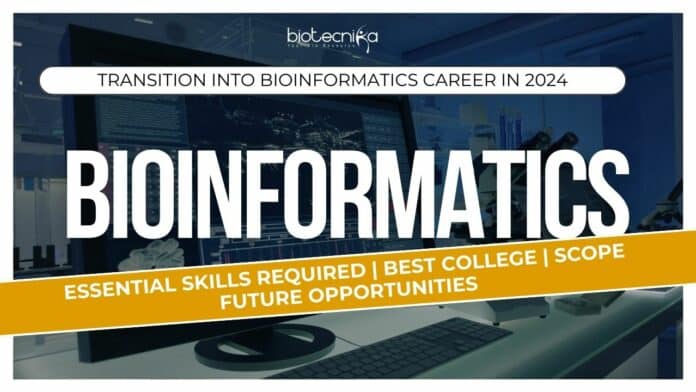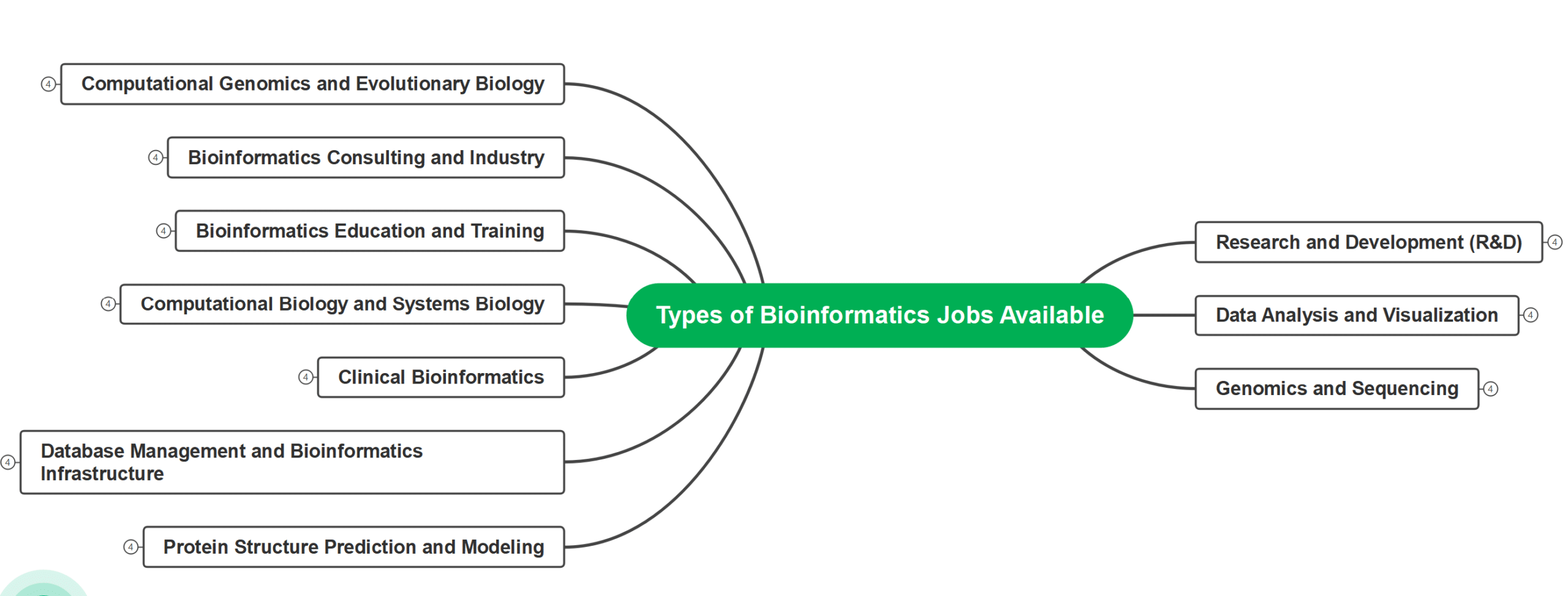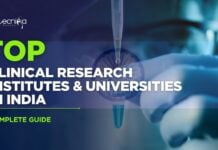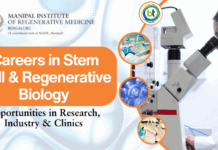Bioinformatics career – Skills Required | Vast Applications | Best College | Training | Scope
Currently, one of the most lucrative career options in the field of life science is Bioinformatics because of its future-oriented problem-solving ability with higher accuracy, low manpower involvement, and high-speed data handling. As we all know, in the modern era every field of science is integrating itself with the use of high-performance computers. The same is applicable for life science too, and hence, the field of Bioinformatics is booming like no other in this particular field.
Before moving forward with the career options in Bioinformatics, we must know what bioinformatics is in the first place and why it has become the need of the hour. Bioinformatics comprises Bio-‘Biology’, infor-‘Information technology’, ma- ‘Maths’, ti-‘Statistics’, cs-‘Computer Science’. Although this is not the standard definition of Bioinformatics, it gives a better idea of what the field is capable of and the interdisciplinary knowledge you need to have in order to pursue this field. If we talk about Bioinformatics broadly, it requires the knowledge of both core biology and computer science.
So, first of all, let’s understand what the need is for using high-performance computers, programming languages, and databases in Life science or Biology.
- The first and foremost problem that computers solve in biology is that of speed and accuracy. If we take the example of drug candidate screening in the drug discovery process, the manual wet lab screenings involving thousands of druggable compounds used to take years of hard work. But now, with the involvement of high-performance computers in the drug discovery process (Computer-aided drug design), we can screen the same amount of druggable compounds in a few days, with better accuracy. Further, we can test the drug for its stability in an in-silico environment using tools like Molecular Dynamics Simulation.
- The second advantage of using high-performance computers is to handle a very large amount of data in one go, processing it, and getting the results within a few days, like handling and analyzing the data coming from sequencing platforms.
- The third most advantage, computer over the classic methods is remote access and handling. This might not sound very useful, but it is, as you can access any high-performance cluster/supercomputer remotely/Cloud computing network from anywhere in the world, which gives you the freedom of doing higher-level research from your comfort space.
Further, advantages involve the object-oriented and future-proof application because computing power is evolving day by day in a fastidious manner from home desktops/laptops to High-performance computing clusters (HPCC), Cloud computing, supercomputers to now quantum computers. As the computing power evolves so will the fields associated with it like Bioinformatics, for example in the late 90’s simulating a simple protein in water for 10 nanoseconds took months and now with the use of HPCC or supercomputers we can simulate more complex simulations of protein-ligand for 100 milliseconds in a few days or even hours.
Table of Contents
Bioinformatics Career – Role in Wet Lab
Bioinformatics is also very crucial for wet lab biologists in many aspects as more often they want to visualize any relevant data from their wet lab experiments in a presentable form and in accordance with the publication standards of reputed journals they can take the help of Python and R libraries like ggplot and Matplotlib.
Apart from that, one can perform the web lab sequencing technique and analyze the data themselves using bioinformatic pipelines to have a better understanding of the whole process. In the current scenario, most of the good journals are demanding hybrid research papers that involve both In-silico and wet lab experiments. The most famously used experimental pipeline nowadays is to do the experiment or screening in-silico as it saves a lot of time and validates the results of that experiment using a few wet-lab experiments. In this way, we can cut short the time and have more confidence in our results.
In order to access all of the things mentioned above, you need to have a core knowledge of Bioinformatics which can catapult your career in many high demanding fields of science practiced worldwide.
The scope of Bioinformatics is endless and forever growing but as it has many branches, it is highly advisable that you must have mastery over at least 3-4 branches to succeed.
Further in this article, we are going to discuss how to get started with Bioinformatics and how to choose the best Bioinformatics career options available worldwide.
BIOINFORMATICS AS A CAREER
When we talk about taking bioinformatics as a career or Career Transition In Bioinformatics, it becomes a different ball game altogether as compared to doing college projects and degrees because the most important thing that the Bioinformatics sector demands are skill sets, command over your skills, and to apply our rational mind in problem-solving. So, the gist of the story is that in the Bioinformatics field skill sets always count over degrees and reputation but that doesn’t mean you should not pursue higher studies like Ph.D. or Post-doc. in this field.
Higher studies like Ph.D. and Post-doc. give you a whole lot of experience and you get better with experience but as I mention in the previous lines also that just a degree without proper knowledge and hands-on experience is not worth anything as for all subjects and particularly in the objective-oriented subjects like Bioinformatics and computational biology.
One who is seeking to learn bioinformatics from scratch or wants to enroll for a degree in Bioinformatics should keep certain things in mind.
| Aspect | Description |
|---|---|
| Adaptability | Being from a biological background, one should be adaptive towards changes as bioinformatics encompasses various disciplines like physics, mathematics, computer science, and statistics. |
| Continuous Learning | In bioinformatics, continuous learning is crucial due to its rapid advancements. Staying updated with current trends is essential for professional growth in this field. |
| Emphasis on Practical Skills | Practical skills are paramount in bioinformatics, as they provide invaluable learning experiences. While theoretical knowledge is important, practical application often leads to deeper understanding. |
| Problem-solving Mindset | Bioinformatics requires a problem-solving mindset, especially when developing pipelines, workflows, and databases using programming languages like Python, R, Java, and PHP. |
| Object-oriented Approach | Having an object-oriented approach is vital in bioinformatics research and development, as it helps in setting clear goals and working efficiently towards achieving them. |
| Streamlined Working | Working in a streamlined manner is essential for efficiency and clarity, ensuring that your work is understandable and reproducible by others in the field. |
| Advanced Skill Sets | Apart from disciplinary aspects, advanced skill sets such as proficiency in specific programming languages, familiarity with bioinformatics tools, and experience with data analysis are advantageous. |
- Adaptability: Being from a biological background, one should be adaptive towards changes because in Bioinformatics you have to deal with sciences other than biology and chemistry like Physics, Mathematics, computer science, statistics and some interdisciplinary subjects.
- Continuous Learning- In all other fields also people do learn and repeat exercises but in Bioinformatics it is to be done in a more profound way as this field is related to computer science and biological research both it is growing in an accelerating manner and in order to keep yourself up to date with the current advancements you have keep your learning curve exponentially growing.
- Emphasis on practical skills- Practical skills or hands-on experiences proves to provide wonders in this field as you can learn more from your practical mistakes than from theoretical knowledge, having said that theoretical knowledge is not to be looked down upon instead it provides the base on which your practical knowledge stands.
- Problem-solving mindset- Bioinformatics is a field where you need to develop a lot of pipelines or workflows and databases etc. mostly with the help of programming languages like python, biopython, R, Java and PHP . So while developing new things, problems will come your way but you have to deal with them in a smart and rational way.
- Object-oriented and streamlined working– When you are in Research and Development it is important to have a goal in mind and work upon it (object-oriented) to achieve the goal or get near it, in this process you might discover something new as well and for the same your work should follow a streamlined pattern which is simple and understandable by others.
All the above-discussed are the disciplinary aspects of growth in the field of Bioinformatics but apart from all these you must need to have advanced skill sets that act as a cherry on the top.
Top Bioinformatics Career Skill Sets
The top skill sets required by a bioinformatician to thrive in this particular field worldwide are as follows:





























 Bioinformatics Analysis, and Genomics, boasting rich experience from institutions like CSIR-IGIB, CSIR-CLRI, IIT Madras, and Delhi Technological University.
Bioinformatics Analysis, and Genomics, boasting rich experience from institutions like CSIR-IGIB, CSIR-CLRI, IIT Madras, and Delhi Technological University.












